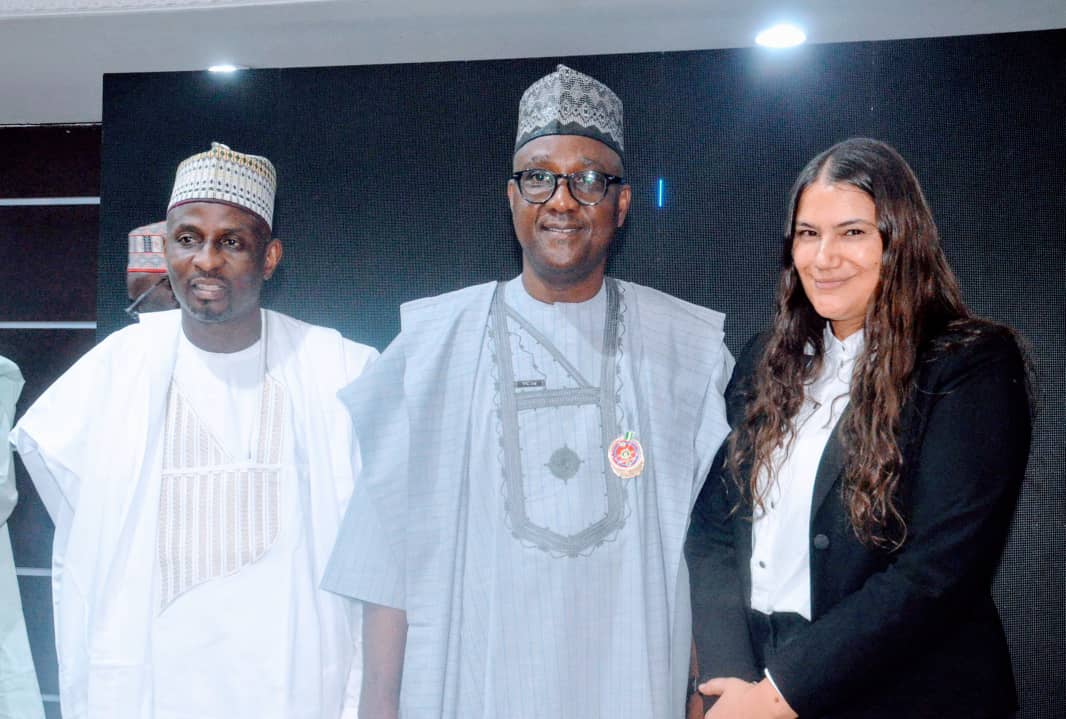News
Speaker Abbas Advocates Non-Kinetic Solutions to Nigeria’s Insecurity

By Gloria Ikibah
As Nigeria grapples with an rapidly increasing security crisis, the Speaker House of Representatives, Rep. Tajudeen Abbas, has called for a paradigm shift in how the nation addresses the root causes of violence.
Speaker Abbas who stated this at a high-level workshop held in Abuja, called for non-kinetic strategies alternatives to military force as essential tools for fostering long-term peace and stability.
Abbas emphasised that while military operations are necessary, they should not be Nigeria’s sole approach to combating insecurity.
Drawing lessons from countries like Rwanda and Kenya, where non-kinetic strategies have mitigated violence and fostered national reconciliation, he advocated for dialogue, economic empowerment, and community engagement as key elements of a sustainable security framework.
“Relying solely on force risks treating symptoms rather than addressing the underlying causes of insecurity,” Abbas said.
He pointed to programs such as ‘Operation Safe Corridor’, which rehabilitates and reintegrates former insurgents, as evidence that alternative approaches can yield positive results.
Speaker Abbas also highlighted the financial burden of Nigeria’s security challenges.
Over the past two decades, trillions of naira have been spent on military operations, with N3.25 trillion 12% of the 2024 national budget allocated to defence and security alone. While acknowledging the necessity of these expenditures, the Speaker argued for a more cost-effective approach: investing in education, healthcare, and infrastructure to address the socioeconomic conditions that fuel unrest.
“Education and economic development are as critical to security as weapons and military personnel,” Abbas stated.
According to Abbas, one non-kinetic measure that has already shown promise in Nigeria is community policing, enabled by the Police Act of 2020. He described it as a key strategy in bridging the gap between law enforcement and local communities. By building trust and empowering citizens, community policing helps foster safer neighborhoods where residents actively participate in securing their environment.
In a landmark announcement, Abbas unveiled the creation of a Standing Committee on Peacebuilding and Social Cohesion in the House of Representatives. Tasked with developing policies to promote peace and stability, the committee will be the first of its kind in Nigeria and possibly Africa.
He commended the United Nations Development Programme (UNDP) for supporting the initiative and pledged the commitment of the House to advancing sustainable security solutions.
The workshop, organized in collaboration with Konrad Adenauer Stiftung (KAS), brought together stakeholders from the security sector, intelligence agencies, and civil society.
Resident Representative of KAS, Marija Peran, extolled Speaker Abbas for his leadership and vision in hosting the event.
“It was Mr. Speaker himself who initiated this very important event, and KAS is proud to partner on this initiative,” Peran said.
She underscored the importance of addressing the root causes of insecurity, arguing that military solutions alone cannot resolve Nigeria’s complex security challenges.
Peran outlined several non-kinetic strategies, including economic development, education, and good governance, and emphasised that poverty and unemployment create fertile ground for extremist ideologies, making economic empowerment a crucial component of any long-term security plan.
“By creating jobs and supporting small businesses, especially for women and youth, we can provide alternatives to violence and reduce the appeal of terrorist groups,” she said.
Education, too, emerged as a critical tool in combating insecurity, Peran therefore called for increased access to quality education in conflict-prone areas, noting that an educated population is less likely to be swayed by extremist ideologies.
“This includes vocational training and civic education that promote tolerance and understanding,” she added.
Good governance and transparency were also identified as essential. According to Peran, corruption and mismanagement undermine efforts to address insecurity, eroding trust between the government and its citizens. She called for stronger institutions and adherence to the rule of law to build a foundation for sustainable peace.
Peran urged legislators to take an active role in advancing non-kinetic strategies. “The legislature has a crucial role to play in shaping policies, allocating resources, and holding the executive accountable,” she said.
As the workshop concluded, Abbas reaffirmed his commitment to seeking innovative solutions that not only address immediate security threats but also tackle their root causes.
“Our focus must be on building a Nigeria where peace and stability are the norm, not the exception,” he declared.
With the formation of the Peacebuilding and Social Cohesion Committee and the continued collaboration of key stakeholders, Nigeria may be on the brink of a new chapter in its fight against insecurity one where dialogue, development, and trust take center stage.
News
NJC investigates 18 Imo judges over suspected age falsification

The National Judicial Council has launched a probe into 18 judges in the Imo State judiciary over allegations of age falsification, in a development raising fresh concerns about integrity and transparency within Nigeria’s judicial system.
The NJC, in a statement on Thursday by its Deputy Director of Information, Kemi Ogedengbe, confirmed that the allegations were being treated with utmost seriousness and were currently under review.
“Allegations of this nature require detailed investigation before any action can be taken,” Ogedengbe stated.
“The NJC is investigating the allegations and may take a decision by the end of the month. For now, we cannot act without completing our inquiries. The council will convene and make decisions on the matter.”
The investigation follows a petition submitted by a civil society group, Civil Society Engagement Platform, which described the matter as an “unprecedented breach of judicial integrity.”
The group alleged that the judges deliberately manipulated their birth records to either prolong their tenure or gain appointments within the judiciary.
In a letter addressed to the NJC Chairman and Chief Justice of Nigeria, Justice Kudirat Kekere-Ekun, the platform cited discrepancies in the judges’ official documents, including Law School registration forms, Department of State Services reports, and Nominal Rolls.
The petition, signed by CSEP’s Director of Investigation, Comrade Ndubuisi Onyemaechi, included what it described as compelling documentary evidence marked as Exhibits 001 to 018.
Among those named in the petition is Justice I. O. Agugua, who reportedly has two different birth dates—May 10, 1959, and May 10, 1960—and is also facing separate allegations of misconduct.
Justice C. A. Ononeze-Madu is alleged to have birth records stating both July 7, 1963, and July 7, 1965, while Justice M. E. Nwagbaoso is accused of presenting conflicting dates of birth—August 20, 1952, and August 20, 1962.
The remaining 15 judges also reportedly have varying inconsistencies in their personal data, a revelation that has intensified public scrutiny of the judiciary’s accountability mechanisms.
The NJC, which is constitutionally empowered to discipline judicial officers, is expected to reconvene soon to deliberate on the findings of its inquiry and take appropriate disciplinary actions where necessary.
The unfolding development comes amid mounting calls for institutional reforms to restore public trust in the judiciary and reinforce ethical standards across all arms of government.
News
Delta committed to safeguard its cultural heritage – Oborevwori

Delta State Governor, Sheriff Oborevwori, has reaffirmed his administration’s commitment to the preservation and promotion of the state’s rich and diverse cultural heritage, describing cultural festivals as vital tools for sustaining indigenous identity.
Oborevwori made this known on Thursday while receiving the President and leadership of the Organisation for the Advancement of Anioma Culture, who paid him a courtesy visit at Government House, Asaba.
Speaking during the meeting, the governor commended OFAAC for its over two decades of dedication to the promotion of Anioma cultural heritage, describing the body as a “vehicle of unity” in Delta State.
He pledged his administration’s full support for OFAAC and similar cultural organisations that contribute to peace, unity, and development.
“I commend OFAAC’s tirelessness and dedication to preserving Anioma culture, heritage, and identity,” Oborevwori said. “Your efforts are crucial in promoting our rich traditions and values.
As a government, we reaffirm our commitment to preserving cultural heritage across the state and supporting initiatives that promote festivals and language, which are essential in shaping our identity.”
Oborevwori also expressed gratitude to the people of Delta North for their overwhelming support during the last governorship election, noting that he secured victory in all nine local government areas within the Anioma region.
“Under our M.O.R.E. Agenda, we have implemented key projects across the Anioma nation and throughout the state. I am particularly grateful to the Anioma people for their strong support and love,” he said.
He further lauded the inclusiveness of OFAAC’s activities, noting its practice of inviting other ethnic groups to its events, which he said fosters unity and cultural harmony across the state.
Earlier, OFAAC President, Arc. Kester Ifeadi, said the purpose of the visit was to formally inform the governor about the group’s forthcoming cultural fiesta, scheduled for Easter Monday.
He described Oborevwori as a “detribalised leader” and commended his administration’s developmental strides across all three senatorial districts in the state.
Ifeadi reaffirmed the support of the Anioma people for the governor’s M.O.R.E. Agenda, emphasising that OFAAC would continue to be a platform for promoting unity among Delta’s various ethnic nationalities.
News
Scores killed as NAF fighter jet bombs insurgents’ stronghold in Sambisa forest

The Nigerian Air Force on Thursday announced that two coordinated airstrikes had successfully neutralised several terrorists and destroyed their hideouts in Borno State.
The precision strikes, carried out under the Air Component of Operation Hadin Kai, targeted known insurgent enclaves in Kollaram and Arra—two areas identified as long-standing terrorist strongholds within the Sambisa general area and the Southern Tumbuns.
According to a statement released by the Director of Public Relations and Information at NAF Headquarters, Air Commodore Edward Gabkwet, the first operation was conducted at approximately 5:30 a.m. in Kollaram, following credible intelligence and surveillance footage that confirmed the presence of high-value terrorist commanders and operational facilities.
“In a bold display of force and precision, the Nigerian Air Force, under Operation Hadin Kai, executed two highly successful air interdiction missions on April 15, 2025, targeting terrorist strongholds in Borno State’s Sambisa general area and the Southern Tumbuns,” the statement read.
“The first strike occurred at approximately 5:30 a.m. in Kollaram, a known insurgent hub. Intelligence reports, corroborated by surveillance footage, confirmed the presence of high-value terrorist commanders and several operational structures, including those equipped with solar panels. NAF assets executed a precision strike, eliminating numerous fighters and disabling key infrastructure.”
Later in the day, at about 3:55 p.m., another strike was carried out in Arra, also within the Sambisa axis.
According to Ejodame, real-time visuals obtained from Intelligence, Surveillance, and Reconnaissance missions revealed clusters of armed militants actively operating in the area.
“Precision-guided munitions were employed during the mission, resulting in the effective destruction of identified targets and significant disruption of the group’s operational capabilities,” he added.
Ejodame emphasised that the airstrikes form part of an ongoing and intensified aerial campaign aimed at degrading terrorist capabilities, dismantling leadership structures, and eliminating insurgent sanctuaries across the region.
Meanwhile, the Defence Headquarters said on Thursday that troops neutralised a notorious terrorist kingpin, Bello Kaura, in a precision airstrike conducted by troops of Operation Fasan Yamma.
Kaura was among the scores of terrorists neutralised by troops between April 10 and 16, 2025, according to the DHQ.
A statement by the Director, Defence Media Operations, Maj. Gen. Markus Kangye, said troops, in collaboration with other security agencies and hybrid forces, carried out a series of coordinated operations in Zamfara, Sokoto, Kaduna, Niger, Kwara States, and the FCT among others.
These operations, he said, were marked by fierce engagements with terrorists, leading to the killing of several insurgents, arrests of suspects, and recovery of a cache of arms and ammunition.
“Between 10 and 16 April 2025, troops conducted fighting patrols and made contact with terrorists in Anka, Tsafe, Talata Mafara, Kaura Namoda and Maru LGAs of Zamfara State as well as Gudu, Isa and Tangaza LGAs of Sokoto State. They conducted operations in Giwa, Chikun and Birnin Gwari LGAs of Kaduna State as well as Bida LGA of Niger State.
“During the encounters, many terrorists were neutralised, including an identified terrorist kingpin, Bello Kaura, in an air interdiction, arrested some of them, while 17 kidnapped victims were rescued,” he said.
He also said troops thwarted oil theft worth over ₦262.7m and arrested suspects.
“During the week under review, Operation DELTA SAFE foiled oil theft worth over N262,702,150.00 only.
“The breakdown indicates: 117,395 litres of stolen crude oil, 22,050 litres of illegally refined AGO, 6,000 litres of DPK and 8,060 litres of PMS. Additionally, they discovered and destroyed 102 crude oil cooking ovens, 94 dugout pits, 18 boats, four speedboats, 56 storage tanks, 164 drums and 42 illegal refining sites. Other items recovered include pumping machines, drilling machines, galvanised pipes, tricycles, motorcycles, mobile phones and nine vehicles,” he said.
Kangye assured the citizens of the Armed Forces’ commitment to protecting national sovereignty and ensuring the safety of all law-abiding citizens.
He said to deny the criminals freedom, the military would take the battle to them.
“We are taking the battle to the enemy to deny them freedom of action, making them thirst for surrender.
“I wish to reiterate the untiring commitment of the Armed Forces of Nigeria to dominate and act in defence of our nation’s sovereignty while guaranteeing the protection of all law-abiding citizens to promote the betterment of our society.
“Our operations across all theatres remain focused, intelligence-driven, and in line with the highest standards of professionalism and respect for human rights,” Kangye added.
He called on the civil populace to continue supporting military operations.
Kangye said, “We once again appeal that the civil populace trust us and see us as friends and partners working for the general good and well-being of the nation. We recognise the sacrifices made daily by our gallant troops, and we salute their courage and dedication.”
-

 News17 hours ago
News17 hours agoBREAKING: Unknown gunmen reportedly storm Senator Natasha’s family residence
-

 News20 hours ago
News20 hours agoSnub story on removal of Rivers Sole Administrator, it’s FAKE-Chief Registrar
-

 News19 hours ago
News19 hours agoSAD! Again, Alleged Herdsmen Attack Three Benue Communities
-

 News11 hours ago
News11 hours agoAbuja light rail project must be commissioned on May 29-Wike vows
-

 Politics19 hours ago
Politics19 hours agoPDP govs are jokers, can’t stop coalition train, Atiku boasts
-

 News16 hours ago
News16 hours agoLawmaker Slams NBA Over Rivers Crisis, Demands Return of N300m
-

 News15 hours ago
News15 hours agoFinally , Lagos Court frees Quadri, young Nigerian who stood before Obi’s convoy in viral photo
-

 News12 hours ago
News12 hours agoSEYI Tinubu Speaks On Alleged Abduction, Brutalization Of NANS President Atiku Abubakar Isah


















